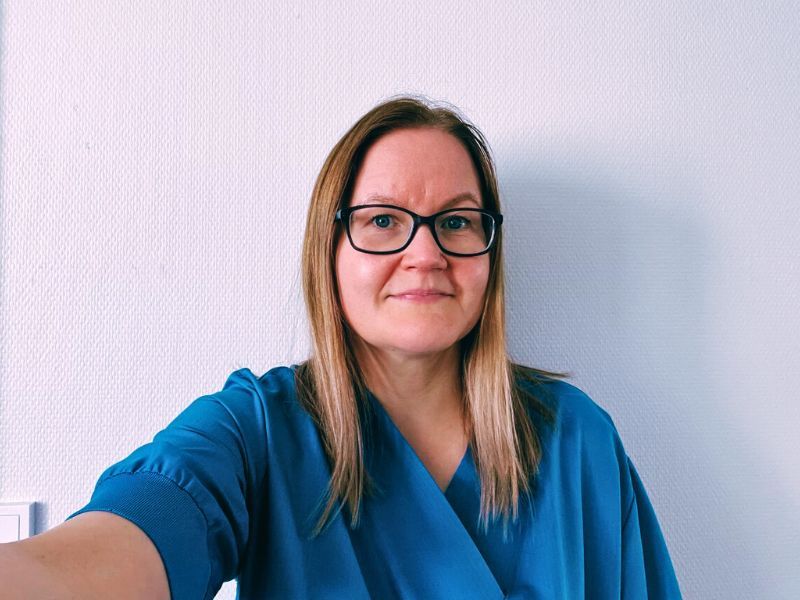Obduction technician
"Obduction technicians must be able to work independently but also in multiprofessional cooperation with other professionals. The work is physically strenuous, so good general fitness is required. Usually the deceased are lifted alone. In the operation room, the metal tray for moving the deceased already weighs 18 kg alone."

- Riikka Yrttiaho
- Obduction technician at Lapland Central Hospital at the Lapland wellbeing services county.
- Graduated as a practical nurse from Rovaniemi Vocational College and later from Savo Vocational College with an apprenticeship contract to become an obduction technician.
- Two years of work experience in the field.
Briefly explain what you do for a living.
I work as an obduction technician in the pathology ward at Lapland Central Hospital. My duties include assisting the pathologist in medical autopsies, as well as storing, handing over and viewing the deceased persons to relatives. The autopsy is either medical or forensic. A medical examination of the cause of death is carried out if the death is known to have been caused by an illness and the deceased has been treated by a physician during their last illness.
How have you ended up in the profession of your choice?
I had been a practical nurse at the Internal Medicine Department for 11 years when I saw my current position’s job advertisement in the hospital's internal communication channel. I applied for the job and got to an interview that included taking part in an autopsy. The work seemed very interesting. I got the job and started my studies as an obduction technician with an apprenticeship, as the profession of obduction technician is only trained for working life needs.
Describe your typical working day or week.
Working days and weeks are very varied. There are weeks when a lot of autopsies are performed, and weeks when no autopsies are performed. What is common to all working days is that I start the day by emptying the pathology department mailbox. An import form is left in the box of the deceased if new deceased persons have been brought into the cold room during the night. I record the details of the deceased in the electronic system and check whether the deceased has a referral for an autopsy. Information on the deceased is also given to the secretary of the department. Next, I will check the calendar to see if there are any scheduled collections of deceased for a funeral or if there are any viewings of deceased for family members for the day. My duties also include collecting deceased persons from hospital wards if a person dies between 8 a.m. and 3 p.m.
What kind of work environment or working hours do you have?
The hospital pathology department includes a cold room, operation room, laboratory and office. Sometimes there are so many deceased persons in the cold room that some have been moved out to the container. My working hours are Monday-Friday from 7:15 or 7:30 to 15:00.
What kind of competence or qualities are required in the profession?
Obduction technicians must be able to work independently but also in multiprofessional cooperation with other professionals. The work is physically strenuous, so good general fitness is required. Usually the deceased are lifted alone. In the operation room, the metal tray for moving the deceased already weighs 18 kg alone.
In addition, manual skills, knowledge of anatomy and command of operation techniques are needed. Operation technology can only be learned by doing. Organisational skills and the ability to encounter the relatives of the deceased are also essential in the work. When faced with grieving family members, it is important to be discreet and empathetic.
What is the best thing about your profession?
The work of an obduction technician is interesting and you are constantly learning new. No deceased person is the same, and there may be surprises in the autopsy. Truly educational are the days when we have students visiting, to get to know autopsy, and the pathologist explains in detail the things that appeared during the autopsy. I also appreciate the working hours because daytime work is not self-evident in the care sector.
What are the downsides of the profession or what seems challenging?
I am the only obduction technician at the Lapland Central Hospital, and sometimes I miss professional discussions with colleagues. I do not receive training on behalf of the hospital, because it is not worth organising for one. The shortage of substitutes also feels challenging, as I can only be replaced by our medical technician, who is not always available either. The physical nature of the work also strains the body.
What would you tell a person considering the profession of an obduction technician?
I would recommend studying as an obduction technician if you are interested in the field. However, it is good to be aware that your own physical and mental well-being must be in order. It is impossible to predict how a loved one deals with death and grief. In this profession, you also encounter children's deaths, so you must also know how to deal with your own unpleasant emotions.
How do you see the future of your profession?
New experts will also be needed in the future, and digital pathology will be the competence of the future that will be needed in the profession. Although, the shortage of doctors may complicate daily life in hospitals. In the future, deceased persons may only be subjected to a post-mortem computed tomography (PMCT) scan instead of an autopsy.
